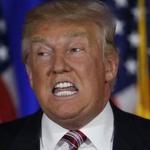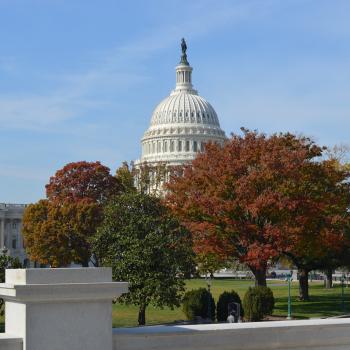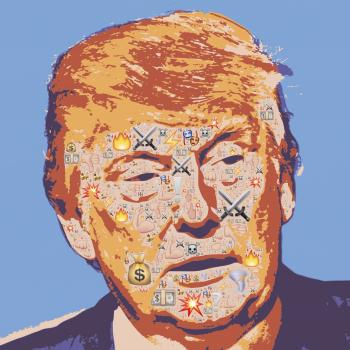In the ongoing probe into Russian interference in the 2016 election, as well as potential acts of collusion or obstruction by President Trump and his team, we’re entering new territory.
That’s right.
As the trial of former Trump campaign chairman Paul Manafort begins today, President Trump’s loyalists are moving on from their argument that there was no collusion.
The argument has now morphed into something resembling: If there was collusion, so what? Collusion isn’t a crime!
It’s a big stretch and bears the stench of desperation.
While appearing on friendly territory, where it was guaranteed he’d receive no push back or any challenge, whatsoever, President Trump’s attorney, former New York Mayor Rudy Giuliani gave the apparent new defense.
“I have been sitting here looking in the federal code trying to find collusion as a crime,” Giuliani said on “Fox & Friends.”
“Collusion is not a crime.”
The president’s attorney maintained that his client is “absolutely innocent” and said that the recently released tapes of conversations between Trump and his former lawyer Michael Cohen prove that the president “didn’t do anything wrong.”
I don’t know that the Cohen tape proved or disproved anything, given it was only about two minutes long, and one expert has suggested that the clip the public got to hear was altered. It was, in his opinion, snipped and spliced, leaving off the beginning and the end, suggesting that there was more that was being held back.
Giuliani further pushed this new defense while appearing on CNN.
“I don’t even know if that’s a crime, colluding about Russians,” Giuliani said. “You start analyzing the crime — the hacking is the crime. The president didn’t hack. He didn’t pay them for hacking.”
And nobody has said he paid for hacking.
That’s curious wording used there, however. “…colluding about Russians.” Was that simply a misspeak from Giuliani, or is he setting up what he sees as some bizarre, but clever defense against any potential charges?
With Giuliani, it’s probably best to just wait until the next shoe falls. I don’t get the impression that he has any real long term strategy.
To be completely fair, however, he may have a point in all of his flailing and frothing.
Collusion is not a crime.
At least, the term, “collusion,” and the image the word tends to conjure up in our minds.
Looking over a piece written by the National Paralegal College on the matter, we get an enlightening view of collusion, and why this is tripping so many people up.
To begin with, “collusion” is a political term, not necessarily a legal term.
The term “collusion” is defined as “concerted activity toward a common purpose.”[2] The colloquial connotation of the word indicates that people who “collude” have worked together, usually in secret, to do something illegal.
And nobody is prosecuted under any crime called “collusion.”
Those on either side of this particular debate mentioning collusion are avoiding the true meat of where we are.
“Collusion,” more accurately, is an umbrella term to encompass a range of potential legal offenses.
According to the NPC, there are three specific, actual criminal offenses that observers should be focusing on in the Russia probe.
CAMPAIGN FINANCE LAW VIOLATIONS
The campaign election law that is implicated here is 52 USC § 30121. There are two relevant parts of the statute.
The first is Part (a)(1)(A), which reads:
“It shall be unlawful for—
(1) a foreign national, directly or indirectly, to make—
-
a contribution or donation of money or other thing of value, or to make an express or implied promise to make a contribution or donation, in connection with a Federal, State, or local election.”
Turning to the June 2016 Trump Tower meeting between Donald Trump Jr, Paul Manafort, Jared Kushner, and several Kremlin-connected Russians, all due to a promise of damaging information from the Russian government, in an effort to aid Trump’s campaign could be considered “a thing of value.”
The fact that former Trump “fixer,” Michael Cohen says he’s now prepared to testify to Mueller that then-candidate Trump knew about the meeting beforehand, and approved, draws the president into the fray, if it can be proven.
Paul Rosenzweig, who served as a deputy assistant secretary for policy at Homeland Security pointed out:
Courts have held that “thing of value” includes intangibles, such as amusement, sexual intercourse, a promise to reinstate an employee, and information.[5]It’s not inconceivable that this could be interpreted to include damaging information on an election opponent.
And no, the Steele dossier does not fall in that category.
Yes, Christopher Steele, the former British intelligence agent to compiled the dossier is foreign, but no, he didn’t not offer the information to give aid to anyone.
He worked for a business. That business was hired to do a job, first for a conservative website, the Washington Free Beacon, then later, by the Clinton campaign.
There are those trying to make that leap and they sound ridiculous.
And desperate.
The second part is (a)(2) of 52 USC 30121. That part provides:
“It shall be unlawful for—
(2) a person to solicit, accept, or receive a contribution or donation… from a foreign national.”
The word “solicit” has a very specific meaning in this context. Election law expert Rick Hasen has said that “solicitation is an oral or written communication that, construed as reasonably understood in the context in which it is made, contains a clear message asking, requesting, or recommending that another person make a contribution, donation, transfer of funds, or otherwise provide anything of value.” If Trump Jr. asked Veselnitskaya to provide “anything of value” on Clinton, then it could be found that he illegally solicited a foreign national to provide a campaign contribution.[6]
And no, it doesn’t matter if Trump Jr garnered any useful information from his meeting with the Russian attorney or not. It matters that he met her with intent.
MAKING FALSE STATEMENTS
It is a federal crime, under U.S. Code Section 1001, Title 18 to “knowingly and willfully” make false statements, and that includes concealing information “in any matter within the jurisdiction of the executive, legislative, or judicial branch of the Government of the United States.” [7]
How many within Trump’s circle can be pinched for making false statements, at this point?
Trump son-in-law and senior adviser, Jared Kushner, has had to file multiple security clearance applications, due to his “forgetfulness.”
Part of that forgetfulness includes a lot of conversations with Russians, including the Trump Tower meeting.
What about Trump Jr? He testified before the Senate Judiciary Committee that his father knew nothing about the June 2016 meeting, but now Michael Cohen is saying that is false.
Again, if it can be proven…
CONSPIRACY
This one is tricky.
The NPC piece spells it out this way:
“Conspiracy” is a “catch-all” crime that applies to plans to commit many different types of illegal acts. A conspiracy is an agreement between two or more people to commit an illegal act, along with an intent to achieve the agreement’s goal. In most jurisdictions, at least one conspirator must undertake an “overt act” taken towards furthering the agreement (this requirement is there to distinguish mere “talk” from a real plan to commit illegal acts).
The general federal conspiracy statute is 18 U.S.C. § 371. This statute states:
“If two or more persons conspire either to commit any offense against the United States, or to defraud the United States, or any agency thereof in any manner or for any purpose, and one or more of such persons do any act to effect the object of the conspiracy, each shall be fined under this title or imprisoned not more than five years, or both.”
So would the Trump Tower meeting fall into that category?
It would require the collection of those emails, phone records, and a lot of testimony proving that Russia, indeed, intended to help the Trump campaign by their actions, that Trump and/or Trump Jr agreed to obtain that information in an effort to turn the election in their favor.
Also, fraud is a tricky topic.
Moreover, it is unclear that interfering with an election (even with false information) constitutes the crime of fraud. In United States v. Gradwell, a 1917 case, the United States Supreme Court held that a conspiracy to influence a congressional election by bribery of voters was not a conspiracy to “defraud” the United States under the meaning of the code since it is the state governments, not the federal government, that administers elections.
It must also be noted that merely promoting or disseminating false information about a political candidate is political speech protected by the First Amendment. As the Supreme Court said in the 2012 case, United States v. Alvarez,[11] false political statements are protected speech, a holding that “comports with the common understanding that some false statements are inevitable if there is to be an open and vigorous expression of views in public and private conversation, expression the First Amendment seeks to guarantee.” Just showing that the Russians intended to lie about Hillary Clinton would be insufficient. The government would have to show that they intended to commit a more specific federal crime to implicate Trump, Jr.
That’s an interesting twist, and not one everyone will be happy with.
So was there collusion?
It’s all going to come down to evidence and how vigorously special counsel Robert Mueller pursues each point, it appears.










